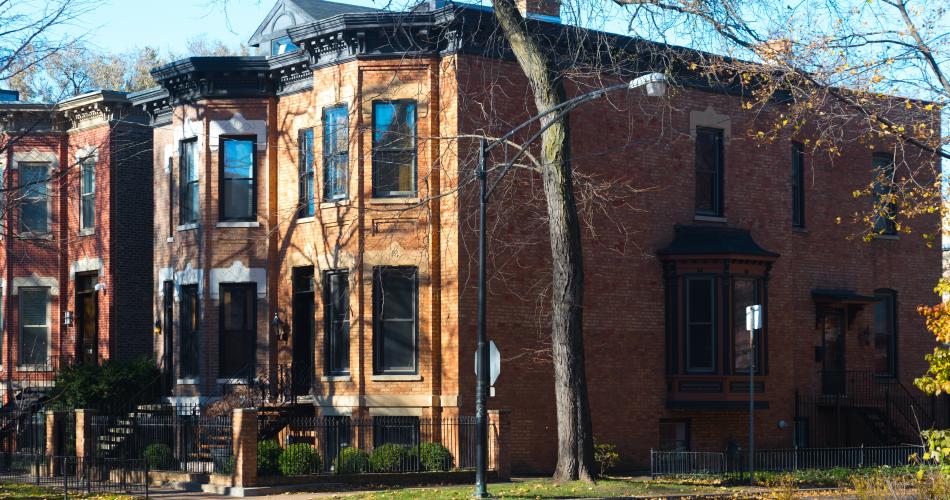Reading time: 6 minutes
We’ve written before about the racist history of housing policy through practices like redlining, the effects of which persist to this day. For decades, federal policies effectively mandated where minorities could live, almost always relegating them to the neighborhoods least accessible to the kinds of jobs, services, and amenities necessary to create upward mobility. Exclusionary zoning laws and other racist federal housing policies including redlining still make it difficult for many non-white Americans to afford a home in high-opportunity neighborhoods that are connected to jobs, amenities, and transit.
Groundbreaking research from David Williams and others at Harvard’s Opportunity Insights confirms that the type of neighborhood, even on a granular, block-by-block level, in which a person grows up is a huge indicator for their future economic and social outcomes. While their research does not make specific policy recommendations, its “broader findings and other related research provide support for policies that reduce segregation and concentrated poverty in cities (e.g., affordable housing subsidies or changes in zoning laws) as well as efforts to improve local public schools.” David presented his research at Up for Growth’s Annual Research Symposium held last fall.
Implementing pro-housing policies that help increase housing affordability, access, and equity is one of the primary drivers behind the Yes In My Backyard (YIMBY) Act, S. 1919 in the Senate and H.R. 4351 in the House. This bipartisan legislation, sponsored by Senators Todd Young (R-IN) and Brian Schatz (D-HI) in the Senate and Representatives Denny Heck (D-WA) and Trey Hollingsworth (R-IN) in the House, would require communities receiving Community Development Block Grant (CDBG) funding to report on the policies that impact housing affordability and availability and any plans they have for enacting said policies.
The YIMBY Act does not condition receipt of funding on enacting any specific reform; indeed, CDBG funding is too important to deny to the communities with the greatest need for affordable housing. Rather, the legislation provides cities, states, and the federal government an opportunity to work together to identify and, we believe, ultimately remove some of the barriers that have long prevented affordable and market-rate housing from being built and that excluded millions from high opportunity communities. The YIMBY Act will also provide important data about how localities are implementing policies to remove housing barriers.
Some of the policies on which CDBG recipients would be required to report include:
- Enacting high-density single-family and multifamily zoning
- Expanding by-right multifamily zoned areas
- Allowing duplexes, triplexes, or fourplexes in areas zoned primarily for single-family homes
- Reducing minimum lot size
- Increasing the allowable floor area ratio in multifamily housing areas
- Creating transit-oriented development zones
- Streamlining or shortening permitting processes and timelines
- Eliminating or reducing off-street parking requirements
- Reducing impact and utility investment fees
- Reducing or eliminating minimum unit square footage requirements
- Allowing the subdivision of single-family homes into duplexes
- Allowing accessory dwelling units (ADUs) on all lots with single-family homes
These are some of the most common policies cited by housing advocates and developers as key to unlocking housing for people of all income levels. Many of these reforms are included in Up for Growth’s Housing Underproduction in the U.S. report. While zoning restrictions have some of the strongest impacts on limiting the supply and affordability of housing, other subtle policies work together to make building enough homes nearly impossible. Legalizing a more diverse array of housing options is a necessary component to righting some of the historic wrongs that exclusionary zoning helped to entrench.
The YIMBY Act was one of the last bills passed by the House before Congress turned its attention almost exclusively to responding to the COVID-19 pandemic. The legislation passed without opposition, a rare display of bipartisanship in a divided Congress. Yet as of this writing, it is unclear if the Senate will take up the bill before the current Congress closes at the end of the year.
Across the country, Americans are having important conversations about equity and how we put the promise of our founding documents and principles into practice. When it comes to jumpstarting a conversation about housing equity, Congress has a ready-made opportunity in the YIMBY Act. We encourage Congress to pass the YIMBY Act to spur real, positive change toward more equitable housing.
